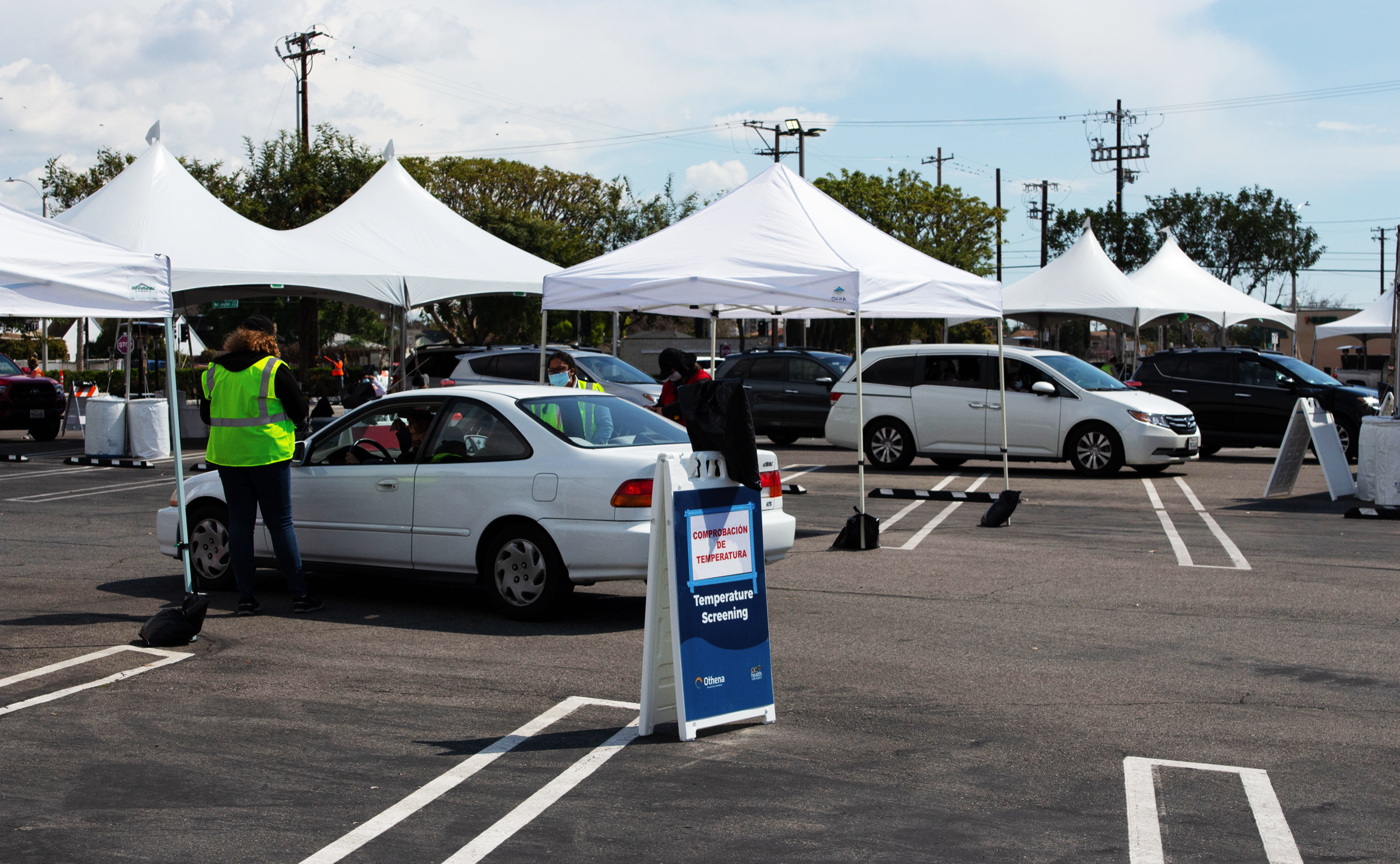‘Don’t lie’: Chapman students go to unusual lengths to receive the vaccine
Students are attempting every way possible to get the vaccine, from driving across state borders to prematurely signing up for an appointment, regardless of ethical consequence. DANIEL PEARSON, Staff Photographer
Kendall Kearnan felt “absolutely disgusting” at the wheel of her 2019 Honda Civic.
She and her roommates were making the five-hour drive back from Glendale, Arizona, after an eight-hour night of shivering and hunger pangs spent volunteering at a vaccination site at the State Farm Stadium. One of them slept in her seat. Another was in the back, engrossed in her Zoom class for most of the trip. Kearnan, a sophomore public relations and advertising major at Chapman University, was herself surviving off a lone bag of Sour Patch Kids, a handful of chips and five bleary-eyed hours of rest. She had nothing much going for her.
Except that her hell of a trip resulted in her getting the Pfizer-BioNTech vaccine.
After learning that working a shift at a vaccine disposal site could result in getting a shot early despite being ineligible until the later phases of distribution, Kearnan journeyed with roommates across state lines to Arizona to volunteer. She in particular may have gone to extreme lengths, but her story reflects the millions of Americans currently ineligible for a vaccine but are trying to do everything in their power to receive it regardless.
Her primary motivation? The desire to see her family in Chicago again.
“I'm not really able to see them because my dad is at risk,” Kearnan said. “I just wanted the vaccine to have that weight lifted off of my shoulders.”
Roommates Kendall Kearnan (left), Sarah Kaiser (center) and Kahea Mark (right) drove to Arizona to receive a vaccine after spending eight hours volunteering at a vaccination clinic. Photo courtesy of Kearnan
While President Joe Biden promised the American people they will be eligible to receive the vaccine by May 1 during his primetime speech March 11, many seem unwilling to wait their turn. For instance, a COVID-19 vaccination clinic in Pasadena had to close its doors last week after people who didn’t qualify for the vaccine took about 900 of the 1,500 slots reserved for essential workers and people older than 65.
Chapman University President Daniele Struppa said in a Feb. 23 announcement that the Orange County Health Care Agency announced educators are eligible for the vaccine, which includes student employees.
A Chapman sophomore, who spoke to The Panther under the sustained condition of anonymity, said he was able to receive the vaccine March 2 from a Walgreens store in Riverside, California, despite the fact he is not a student employee. When he registered his vaccine appointment online, he simply stated he worked in the education industry. According to the student, he only showed the vaccine administrator his driver’s license, not his university identification card, and was then vaccinated.
When asked about the ethics of circumventing the current system, the student argued that the onus is on the vaccination site to ensure they are enforcing the rules and giving the vaccine to those who are eligible.
“Everyone has to be conscious of the fact that it's been a year and you have no idea how hard this pandemic has been on somebody,” the student said. “If you're going to try to shame or interrogate someone who got the vaccine about why they got it, you should reassess your stance and come at it from a different angle … one of empathy and understanding.”
Similar to Kearnan, the student said he wanted to receive the vaccine solely out of desperation to see his family.
Bridget McGarry, a sophomore creative producing major who works as a tour guide for the Dodge College of Film and Media Arts, received the vaccine March 10 at the Keck Medical Center of the University of Southern California due to her categorization as a student employee. McGarry had the coronavirus and experienced symptoms for 10 days this past November, and told The Panther she’s upset at the concept of people lying to get the vaccine.
“It's terrible that people have been doing this, and it makes me really upset because my grandmother is in the hospital on a ventilator with COVID-19 right now,” McGarry said. “Don't lie, wait until you're eligible, and then go get it.”
The vaccine rollout has been widely criticized as vaccines are disproportionately going toward wealthier and largely white demographics, leaving behind the minority communities who have been hit hardest by the pandemic. According to an analysis by the Kaiser Family Foundation, the vaccination rate among white people across 35 states was over two and a half times higher than the rate for Hispanic people, and almost twice as high as the rate for Black people.
“People are falsifying their qualifications to get (the vaccine) and it is really hurting the people who actually need it,” Kearnan said. “My parents both drove six hours (to a vaccine clinic), because that was the closest place that had vaccines available.”
Kearnan said she will once again take a road trip to Arizona to receive the second dose of the Pfizer-BioNTech vaccine March 27.


